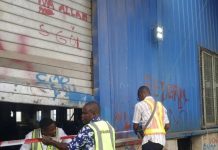The continued closure of Nigeria’s borders to neighboring countries would exacerbate the stagnation of the economy, Nigerian financial experts have warned.
Titus Okunrounmu, a former director of the Central Bank of Nigeria (CBN), told reporters in southwest town of Ota in Ogun state that the closure would stifle economic growth of the country.
The Nigerian government had in August partially closed the country’s borders with neighboring countries as a proactive measure in checking cases of smuggling into the country.
Okunrounmu, who served as director in the department of budgetary of the apex bank, said shutting down of borders will further complicate economic challenges as the nation is still importing a lot of goods into the country.
“Closing the nation’s borders is not the solution to our economic under-development,” he added.
The economy will continue to be stagnant because the smugglers would find alternative means of bringing their goods into the country and warned that the trend would negatively affect revenue generation, the former banker said.
He urged the government to take steps to develop the economy by looking inwards to proffer solutions to the immediate problems affecting the economy.
Meanwhile, the Association of Nigeria Licensed Customs Agents said over 500 trucks loaded with perishable goods were stranded at Seme following the partial closure of the border.
Bisiriyu Fanu, a senior member of the association, told reporters in Lagos that the stranded goods belonged to genuine importers who had paid government duties but got stuck by the partial border closure.
According to him, the partial border closure is impacting negatively on the nation’s economy.
“The impact of the closure is enormous, if you go to some markets in Lagos like Balogun, Idumagbo, Idumota and Oyingbo, people from neighboring countries who always patronize them are no more coming,” he added.
Fanu urged the government to take physical examination of the trucks at the border post and allow them into the country.
The joint-border security exercise, code-named “Ex-Swift Response”, was ordered by the government and was aimed at securing Nigeria’s land and maritime borders.
The exercise commenced on Aug. 19 and was being jointly conducted by the customs, immigration, police and military personnel and coordinated by the Office of the National Security Adviser.







